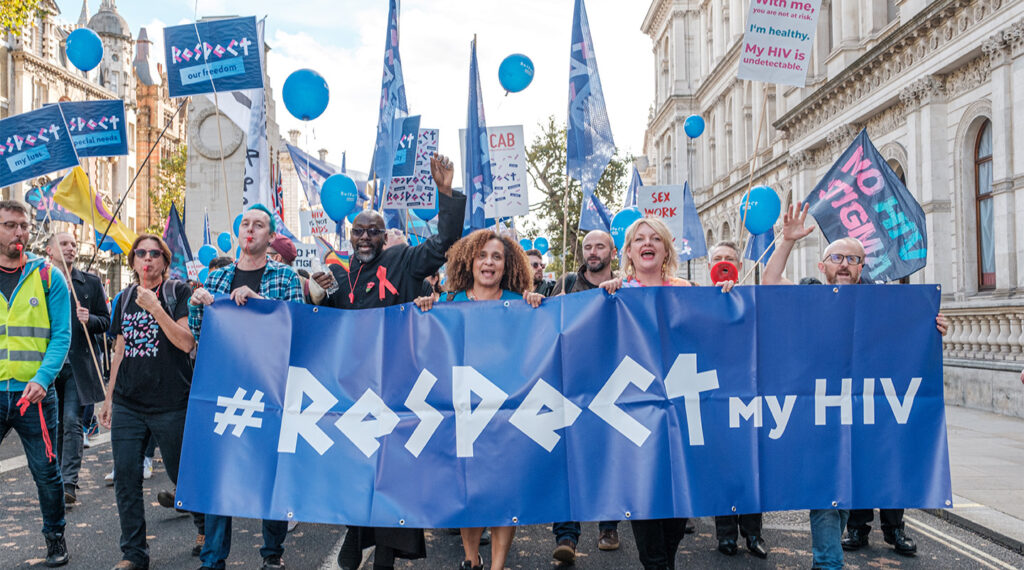Uncertain Future for Russian HIV-service NGOs: Navigating Legal Challenges and Foreign Funding

Russian HIV-service NGOs and the broader charity sector find themselves grappling with a second consecutive crisis, significantly impacting their ability to aid those in need.
The first blow was dealt by the COVID-19 pandemic, with its cascading effects on public health infrastructure and drastic shifts in resource allocation. During the pandemic, numerous specialised medical facilities addressing HIV were repurposed for COVID-19 treatment, leading to a substantial decline in the quality of life for HIV patients. Forced to adapt swiftly, non-profit organisations underwent a comprehensive restructuring, transitioning to remote service delivery and implementing programs aimed at safeguarding the psychological well-being of both their clients and employees.
As the sector began recovering from the pandemic’s aftermath and even devised innovative approaches to assist beneficiaries, a new crisis unfolded with the Russian invasion of Ukraine. This geopolitical event triggered a series of challenges, including the imposition of sanctions, the isolation of the country, and the introduction of stricter laws targeting LGBTQ+ individuals. The government’s labelling of NGOs as “foreign agents” and the designation of some as “undesirable organisations” further exacerbated the predicament. The fallout was intensified by a decline in donations from local sources.
Meanwhile, the HIV epidemic has persisted. Despite a decrease in the rate of new cases, the number of registered HIV cases in Russia remains alarmingly high, with approximately 40,000 new people living with HIV recorded in the first nine months of 2023 alone. The cumulative number of identified cases in the country has surpassed 1.1 million.
The looming question for Russian HIV-service NGOs is the outlook for their near future. Can they weather the current challenges? And is external support still a viable option?
The planning horizon has shrunk
As 2022 drew to a close, the Center for Evaluation of Public Initiatives at the Higher School of Economics undertook a survey assessing the impact of sanctions, the departure of foreign companies, and the blocking of social media platforms such as Instagram and Facebook on Russian NGOs. A total of 227 NGOs from 54 regions, including HIV-service ones, participated in the survey.
Approximately 40% of respondents reported alterations in their overall funding, citing a decline in grant money and donations from private individuals and businesses. NGOs specialising in social services and medical care (43%) and those addressing environmental and human rights issues (42%) were most affected by funding reductions. Notably, organisations assisting people with HIV and vulnerable groups like LGBTQ+ individuals, prisoners, and people who use drugs also experienced financial setbacks.
In 2022, a prevailing trend emerged among NGOs, revealing a substantial increase in workload (75%) and the number of beneficiaries (59%). However, this surge in activity coincided with a decline in the emotional stability of employees (50%). A staggering 84% of NGOs providing social services and medical care, particularly those catering to specific beneficiary groups such as migrants, refugees, and HIV-positive people, grappled with an overwhelming surge in workload (92%).
Interactions with the state became more challenging for many NGOs due to new bureaucratic procedures and difficulties in fostering trusting partnerships. The country’s division over the invasion of Ukraine further complicated these relationships. Concerns over potentially being labelled “foreign agents” added to the anxiety, especially with ambiguous criteria for determining “foreign influence” under the new legislation. (Previously, an individual or organisation had to receive funding from abroad and engage in “political activities” to be deemed a foreign agent. Now, it’s enough to be “under foreign influence” – whatever that means.)
NGOs in the social services and medical care sectors highlighted the loss of interactions with the international expert community as a significant problem. Access to global best practices and partnerships with foreign experts and scientists has traditionally played a crucial role in their work.
The scope of acute social problems tackled by NGOs expanded to include issues related to refugees from annexed territories of Ukraine, as well as the well-being of Russian servicemen and their families. This, however, brought complications in providing assistance to other socially vulnerable groups.
The planning horizon for many NGOs has shrunk, with 28% thinking about the coming 1-2 years, and 36% limiting their planning to one year.
Looking ahead, Russia’s charitable sector faces formidable challenges. According to the Nuzhna Pomosch Foundation’s annual survey, the Russian population’s loyalty to the charitable sector remains low in 2023. Limited financial opportunities coupled with decreased willingness among Russians to donate to charitable organisations (as voiced by only 38% of respondents) paint a challenging outlook. Support for the “foreign agents” law has grown in the past two years, contrasting with a decline in readiness to publicly support organisations holding such a designation.
HIV epidemic continues to grow
Russia is still grappling with a severe HIV crisis, holding the unfortunate distinction of being the European leader in the incidence of the disease. In 2022 alone, over 61,000 new HIV cases were reported, solidifying the nation’s status as a hotspot for the epidemic in the Eastern Europe and Central Asia region. (Though year-on-year this rate has decreased.) The economic toll of HIV infection, encompassing government spending on medications, medical care, and indirect costs related to premature death and disability, reached a staggering 262.5 billion rubles last year.
The dire situation could worsen if HIV-positive individuals are denied access to essential medications, a scenario exacerbated by recurring drug shortages. Since the start of 2023, the public movement “Patient Control,” dedicated to monitoring the availability of HIV treatment drugs, has received 343 reports of medication shortages, including from annexed territories of Ukraine. This marks a significant increase from the 210 reports recorded for the entire year of 2022 and 182 for 2021. While the number may seem proportionally small in relation to the total HIV-affected population, it’s crucial to acknowledge that not all patients are aware of the avenue to report shortages, and some may fear confronting health officials.
Before its aggression against Ukraine, Russia boasted over 90 non-governmental organisations dedicated to assisting people with HIV and vulnerable populations. Their current status remains uncertain, with some operating on a precarious grant-to-grant basis, experiencing periods of dormancy. Amidst the backdrop of increasingly stringent legislation targeting the LGBTQ+ community, particularly transgender individuals, certain initiative groups and organisations have not only scaled back their activities in Russia but have also evacuated willing employees. In contrast, some organisations have opted for closer collaboration with the state, hoping to secure stable funding in the current environment.
The intersection of a rising HIV crisis, medication shortages, and the uncertain future of NGOs paints a challenging picture both for those affected by HIV and NGOs that are helping them.
Assistance is a viable option, but available opportunities are dwindling
After the outbreak of war in Ukraine, Russian HIV-service NGOs feared that large foreign donors, who for many decades have been (and still remain) the main sources of funding in this area, would leave the country. Fortunately, this has not happened so far. Organisations such as the Global Fund to Fight AIDS, Tuberculosis, and Malaria, the Elton John AIDS Foundation, Sidaction, Médecins Sans Frontières, and Médecins du Monde, among others, continue their vital projects in Russia. Some banks still facilitate foreign transfers in dollars and euros, albeit with extended currency control measures.
The precarious situation stems from a new law enacted in August 2023, imposing administrative and criminal penalties for “participation in the activities” of unregistered foreign NGOs. Ordinary citizens can face fines up to five thousand rubles, officials up to 50 thousand rubles, and legal entities up to 100 thousand rubles under administrative law. Repeat offenders or organisers of unregistered NGO activities may face imprisonment for up to three years.
The ambiguity of what constitutes “participation in activities” has left many in a state of uncertainty. Some lawyers posit that public support on the internet, financial assistance for events, or cooperation in organising various activities could fall under this vague provision. At the same time, other lawyers are sure that, for example, receiving a donation from a foreign NGO is not covered by this law. The legal community awaits enforcement practices and the first case of prosecution to gain clarity.
Presently, only three foreign HIV-related NGOs are registered with the Ministry of Justice— the AIDS Healthcare Foundation, Médecins Sans Frontières and Médecins du Monde. Whether other organisations will be allowed – or want – to get registered, remains uncertain..
Adding to the complexity, the Russian Ministry of Justice has filed a lawsuit to label the “international public movement of LGBT” as an extremist entity, potentially outlawing initiatives supporting the LGBT community. The Supreme Court satisfied this lawsuit on November 30, raising concerns about the broader implications for organisations and initiatives addressing LGBT issues. The latter could include HIV-related ones.
In the face of these challenges, Russian NGOs contemplate various options for foreign support, including cryptocurrencies, cash brought legally from abroad, money transfers to individual cards, establishing NGOs in friendly jurisdictions and then registering their branches in Russia, or operating commercial entities for service-based funding. Each option requires a high level of flexibility from foreign donors and a nuanced understanding of Russia’s current socio-political climate.
Russian NGOs, meanwhile, express their commitment to advocating for the rights and health of their beneficiaries, vowing to persevere “to the last man.”
Authors

